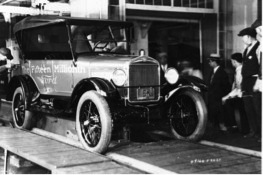Honk if You Love the Mass-Produced Automobile
By: Randal O’ToolePosted on November 20, 2013 Wall Street Journal Topics:
Monday, Oct. 7, will mark the 100th anniversary of the opening of Henry Ford's moving assembly line for producing the Model T. This innovative production system allowed Ford to double worker pay while cutting the price of his cars in half, making it possible, for the first time, for auto workers to buy the cars they built.
Time magazine lists the Model T among its "50 worst cars of all time" because "the consequences of putting every living soul on gas-powered wheels" were (supposedly) so negative. The Obama administration seems to agree with that bleak summation. Its recent strategic plan for the Department of Transportation focuses exclusively on such negative consequences, which allegedly include the high dollar cost of driving, poorly designed cities, greenhouse gases and obesity. The "Livable Communities" section of the plan, for instance, says that Americans drive too much because cities are designed to make us "auto dependent," and the plan's goal is to rebuild cities to induce people to drive less.
In fact, many of the supposed negative costs of cars are purely imaginary, while others are rapidly declining. Each year's crop of new cars is safer, more fuel-efficient and less polluting than before. Department of Energy data show that in 1970 cars used twice as much energy per passenger mile as did mass transit. Today, they are practically tied, and in a few years driving will use less energy and emit less pollution than public transit.
For more than 60 years, Americans have consistently spent around 9% of their personal incomes on driving, even though per-capita miles have tripled since 1950. According to data from the Bureau of Transportation Statistics—counting both user costs and subsidies—public transportation costs nearly four times as much per passenger mile as driving, while Amtrak costs well over twice as much.

A Ford Model T on the assembly line in 1927, the 15 millionth the company produced.
The costs of driving are overwhelmed by the benefits of mass-produced automobiles, benefits largely ignored by the Obama administration and various anti-auto groups. Ford democratized mobility: Today, 91% of American households have at least one car, and 96% of commuters live in a household with at least one car. Curiously, Census Bureau statistics indicate that more than 20% of commuters who live in carless households still get to work by driving alone (apparently in borrowed cars).
By tripling urban travel speeds, autos gave workers access to better jobs and employers access to a wider pool of workers, contributing to a huge increase in worker productivity. Per-capita GDP has increased by nearly nine times in the last century, and autos are responsible for a large share of that increase.
Automobiles relieved people of the need to live in cramped tenements that were within walking distance of their jobs. By giving workers access to cheap, unregulated land at the urban periphery, cars contributed to a 50% rise in homeownership rates since 1940. Cars also gave everyone access to a huge variety of low-cost consumer goods. In 1913, the average grocery store had fewer than 500 products for sale; today, the average is more than 20,000. Without cars, modern retailers from Krogers to Whole Foods, Wal-Mart to Costco, and Tru-Value to Restoration Hardware simply could not exist.
Cars were an essential ingredient in both the civil rights and women's rights movements. The Montgomery bus boycott succeeded because enough blacks owned cars that they could share rides to work with former bus riders. Women's rights became a certainty when enough families owned two cars so that both spouses could drive to work.
Although cars are often blamed for urban sprawl, in fact they have preserved far more productive farm and forest land than urban areas have consumed. Before cars, trucks and tractors replaced animal power, farmers devoted close to a third of their land to relatively unproductive pasture. Since 1913, close to 200 million acres of that pasture has been converted to productive crop or forest land. By comparison, all the low-density suburbs in America occupy well under 100 million acres.
Mass-produced automobiles gave low- and moderate-income people access to forms of recreation previously available only to the rich. For example, in 1912, fewer than one out of 4,000 Americans visited Yellowstone Park; last year, it was more than one out of 100. Autos greatly contributed to human health and safety. Thanks to paved streets and automotive technology, fire departments and paramedics save hundreds of thousands of homes and thousands of lives each year.
When Hurricane Katrina struck the Gulf Coast in 2005, New Orleans had the second-lowest per-capita auto ownership of any major city in America. As documented in news reports at the time, a result of the immobility was tragedy as hundreds of people died and tens of thousands were stuck in the city. When Hurricane Rita hit Houston a few weeks later, autos allowed four million people to evacuate with almost no casualties.
Personally, I hate to be behind the wheel of a car and look forward to driverless cars. But as an economist, I realize that the mass-produced auto is one of the greatest inventions in history. Instead of trying to reduce driving, we should encourage it while continuing to make it safer, cleaner and more energy efficient.
Mr. O'Toole is a senior fellow with the Cato Institute and author of "Gridlock: Why We're Stuck in Traffic and What to Do About It" (Cato, 2010).
A version of this article appeared October 4, 2013, on page A11 in the U.S. edition of The Wall Street Journal, with the headline: Honk if You Love the Mass-Produced Automobile

